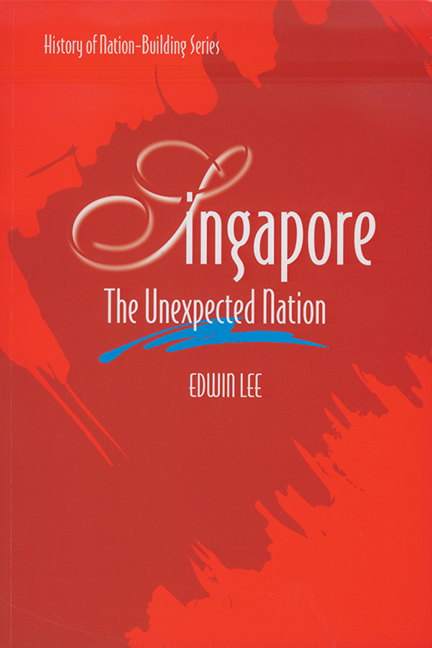Book contents
- Frontmatter
- Dedication
- Contents
- Preface
- Introduction by Wang Gungwu
- Chapter One Beginnings: From Temasek to Singapore
- Chapter Two Race, History and Nationalism
- Chapter Three Contestants and Contesting Visions
- Chapter Four The Accidental Chief Minister
- Chapter Five The Terminal Chief Minister
- Chapter Six The Embattled Prime Minister
- Chapter Seven Merger: Contesting Ownership and Principles
- Chapter Eight Terms of Disendearment
- Chapter Nine Dare to be Equal
- Chapter Ten The Way to Survive
- Chapter Eleven National Service: The Price of Independence
- Chapter Twelve Politics of Education
- Chapter Thirteen Home Ownership, National Stability and the New Middle Classes
- Chapter Fourteen University and Nation
- Chapter Fifteen Toh's Nation-Building Thrust
- Chapter Sixteen Nantah: Between Community and Nation
- Chapter Seventeen Self-Renewal: Talents for a Tough Act
- Chapter Eighteen The Consensual Prime Minister
- Chapter Nineteen Confucianism, Christianity, Chineseness
- Chapter Twenty Singapore Dreams, Singapore Dilemmas
- Chapter Twenty-One The Hyphenated Singaporean
- Chapter Twenty-Two The Unexpected Nation
- Bibliographical Note
- Index
- The Author
Chapter Seventeen - Self-Renewal: Talents for a Tough Act
Published online by Cambridge University Press: 21 October 2015
- Frontmatter
- Dedication
- Contents
- Preface
- Introduction by Wang Gungwu
- Chapter One Beginnings: From Temasek to Singapore
- Chapter Two Race, History and Nationalism
- Chapter Three Contestants and Contesting Visions
- Chapter Four The Accidental Chief Minister
- Chapter Five The Terminal Chief Minister
- Chapter Six The Embattled Prime Minister
- Chapter Seven Merger: Contesting Ownership and Principles
- Chapter Eight Terms of Disendearment
- Chapter Nine Dare to be Equal
- Chapter Ten The Way to Survive
- Chapter Eleven National Service: The Price of Independence
- Chapter Twelve Politics of Education
- Chapter Thirteen Home Ownership, National Stability and the New Middle Classes
- Chapter Fourteen University and Nation
- Chapter Fifteen Toh's Nation-Building Thrust
- Chapter Sixteen Nantah: Between Community and Nation
- Chapter Seventeen Self-Renewal: Talents for a Tough Act
- Chapter Eighteen The Consensual Prime Minister
- Chapter Nineteen Confucianism, Christianity, Chineseness
- Chapter Twenty Singapore Dreams, Singapore Dilemmas
- Chapter Twenty-One The Hyphenated Singaporean
- Chapter Twenty-Two The Unexpected Nation
- Bibliographical Note
- Index
- The Author
Summary
The year 1980 marked twenty years of PAP rule and fifteen years since independence. Success measurable in numbers was evident everywhere, in the high-tech, high wage-economy, in public housing with home ownership rising strongly, in education with tremendous expansion of schools and teacher training, and a new formula to address the failure rate in bilingualism, and in national service, with the steady increase in operationally ready NS men (reservists).
But material success alone cannot make a nation. Dr Goh Keng Swee could easily cite countries which did not have Singapore's sparkling economic performance and yet had a much more robust national feeling.
The position of Singapore's two universities in the ’60s and ’70s well exemplify the problem of the time: the lack of national identity and unity. The two universities were pinnacles of the great divide between the Chineseeducated and the English-educated Chinese. There were other pinnacles and other divides in Singapore's complex multiracial structure to confound the nation builder seeking to create unity and common ground.
For this reason, Lee and his colleagues did not expect a nation to be established, other than in name, anytime soon. They knew they were in for the long haul. For a long time still, the nation would exist only in the minds of the nation builders themselves, in their will and passion to create one. “You cannot gel people into a nation in sixteen years,” Lee declared in March 1982. “But we can get a core to gel. And that is what the PAP has done. The PAP is at the heart of the nation.”
Since the PAP which held the nation together was mortal, Lee faced up to the issue of self-renewal. It was of the utmost importance to him to create a younger team of leaders to continue the nation-building project. He was also convinced that it was never too soon to start. The search and co-option of the younger leaders went on simultaneously with the other programmes on his agenda. In 1980, Lee promoted six of the younger leaders he had been trying out from ministers of state to full ministers. At the same time, he signalled to the stalwarts of his generation whom he was having to retire from the cabinet, and who disagreed with him on the rationale and timing of his succession planning, that self-renewal was at hand and irreversible.
- Type
- Chapter
- Information
- SingaporeThe Unexpected Nation, pp. 453 - 486Publisher: ISEAS–Yusof Ishak InstitutePrint publication year: 2008

